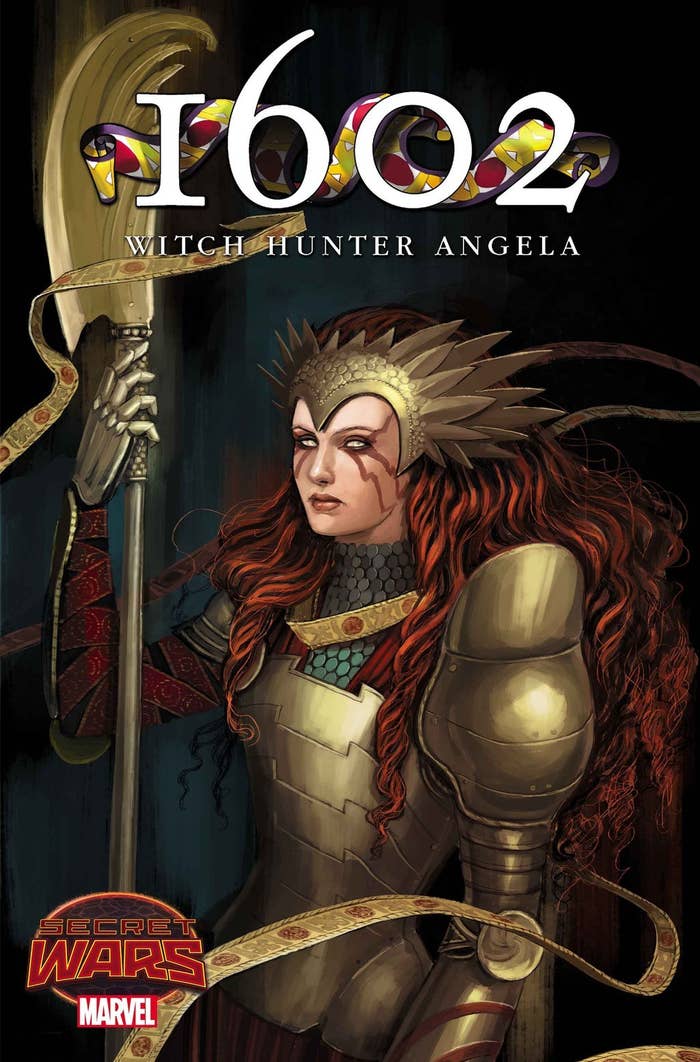
Tell us a little about Angela's second solo book.
Marguerite Bennett (co-writer): It's Secret Wars/War Zones series, and we're going back to Neill Gaiman, Andy Kubert, and Richard Isanove's 1602. Queen Elizabeth has been recently murdered, King James has ascended the throne, and throughout the entire country there's a persecution of those who are considered witchbreed, which is the 1602 equivalent of mutants. We're combining this history and this flourishing time of Western literature with the mythology of the Marvel universe.
I'm co-writing the series with Kieron Gillen, and we're gonna have a similar structure to our current book, a 15-page overstory that focuses on Angela and Sera and a five-page substory that is a tale that Sera is telling. The art is being done by Stephanie Hans, who did the painted five-pagers in the first Angela arc, and her style is just so gorgeous and I could not hope for anyone better to help me bring this to life. The five-pagers in 1602, they'll each be drawn by a different artist.
Of all the characters to to throw into 1602, why Angela?
MB: Angela's got those lofty and mythic proportions already; there's definitely this sense of grandeur in getting to see her and Sera both through this wandering, holy mission lens.
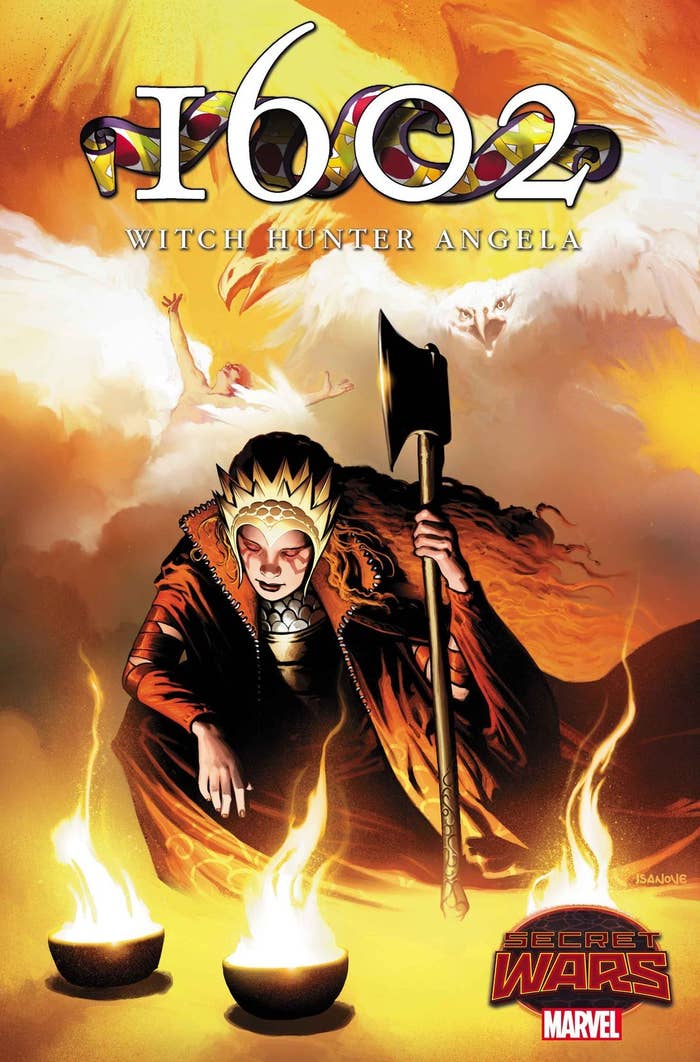
Because Sera is going to journey with Angela again, does that mean that they have a similar backstory in 1602 as they do in the current run? Does that mean we're going to see Asgardians and other familiar faces?
MB: Yes, they have a similar backstory! Asgardians I can't confirm, but we will definitely see a lot of familiar 1602 characters. We want to make the series our own; I'm a huge fan of Neil Gaiman and the original run, but we really didn't want to just retread something that was already very beloved, we wanted to go out and explore the furthest corners of that universe. So you're going to see people who never appeared in the original series. We've got a 1602 Bucky Barnes, and we've got 1602 Guardians of the Galaxy, which has never been done before! So yeah, we're very excited to have fun with it and tear off full speed ahead.
I'm so excited to see 1602 Bucky Barnes and all his glorious eyeliner.
MB: (laughs) I mean this isn't a spoiler, but I basically needed literally the most handsome man in the Marvel universe for this character, sooooo that meant Bucky Barnes.
Sana Amanat (editor): Uhhhhh, that's Gambit, personally I think it's Gambit.
Jaimie McKelvie's Commander Rogers, that's my personal pick but...
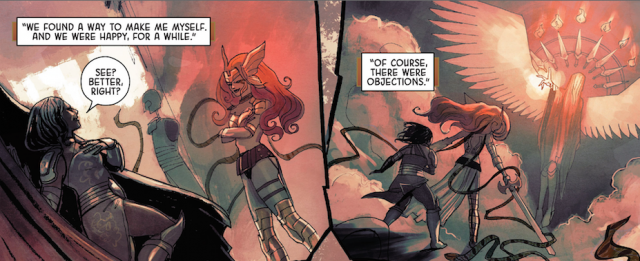
In terms of Sera, how will we see a transwoman represented in 1602?
MB: Well you know, despite the fact that gender roles are so narrow during that day and age there were lots of portions of society where you were given freedom, the further from the court life you were. Court life, which we understand, where most of our historical records and most of the art of the day was coming from. So when we involve you know, holy orders such as what Angela essentially is, even in the standing Marvel universe, you can get into a little more freedom. There are a number of historical monks who were women and people who were allowed to live healthy trans lives in these halls of higher learning. These orders of monks were mostly responsible for the preservation of art and literature. It's funny that these halls of learning and highly sequestered gender roles are the best place to find lots of trans people throughout history.
Will you guys take this opportunity to more clearly define Angela and Sera's relationship? Will they be a more communicative pair in 1602; will we see different sides of Angela and Sera come into play?
MB: We will absolutely see different sides of Angela and Sera, and we'll learn more about them through their relationships to one another. We'll uh — never mind that's a spoiler, I got to play some things close to the chest.
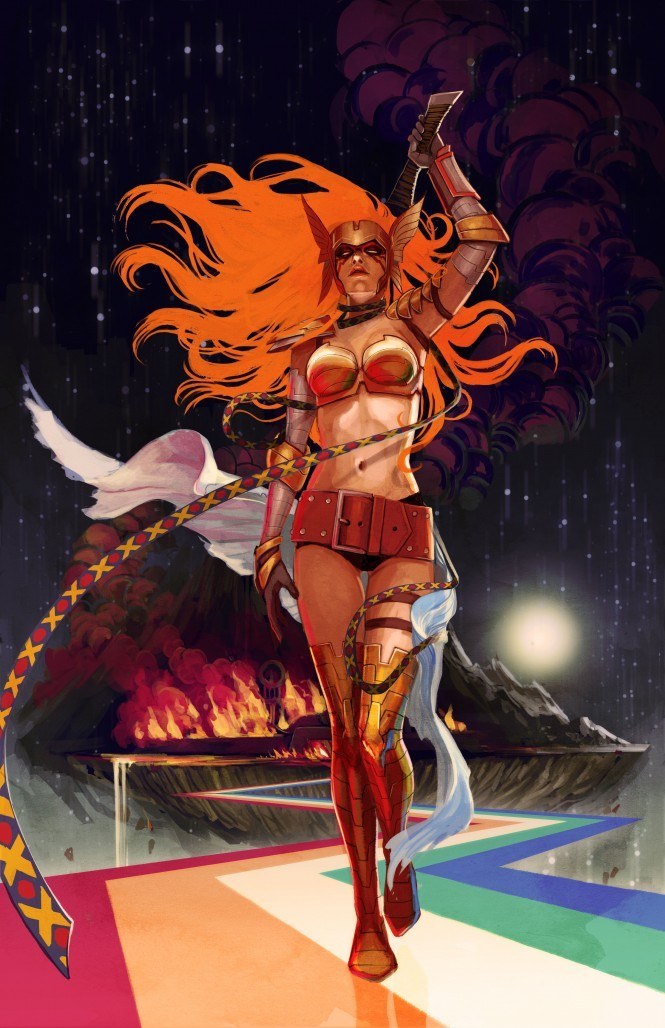
Marguerite, does it feel like you're writing fanfic of your own work now that you're writing Angela in an alternate universe on top of her standing Marvel series?
MB: Yes! It's so surreal, but we really wanted to have fun with it. We've got a regular Marvel series, we've got Marvel 1602, we've got Marvel 1602 as a war zone in Secret Wars, and we've got it with fairly new characters. Angela's fairly new to the Marvel universe, so we're just leaning into how fun it can be. We want to make it accessible and we just want to really enjoy ourselves.
SA: That's also what's so exciting about Secret Wars in general — there's so many stories coming out here that are really representative of the Marvel experience and what makes Marvel stories so great, it's all the things that make you a Marvel fan and it's all happening at the same time.
MB: That's absolutely true.
AUs on top of AUs on top of AUs, it's great a fandom experience.
SM: Totally — if you like any one of them then you'll enjoy this series.

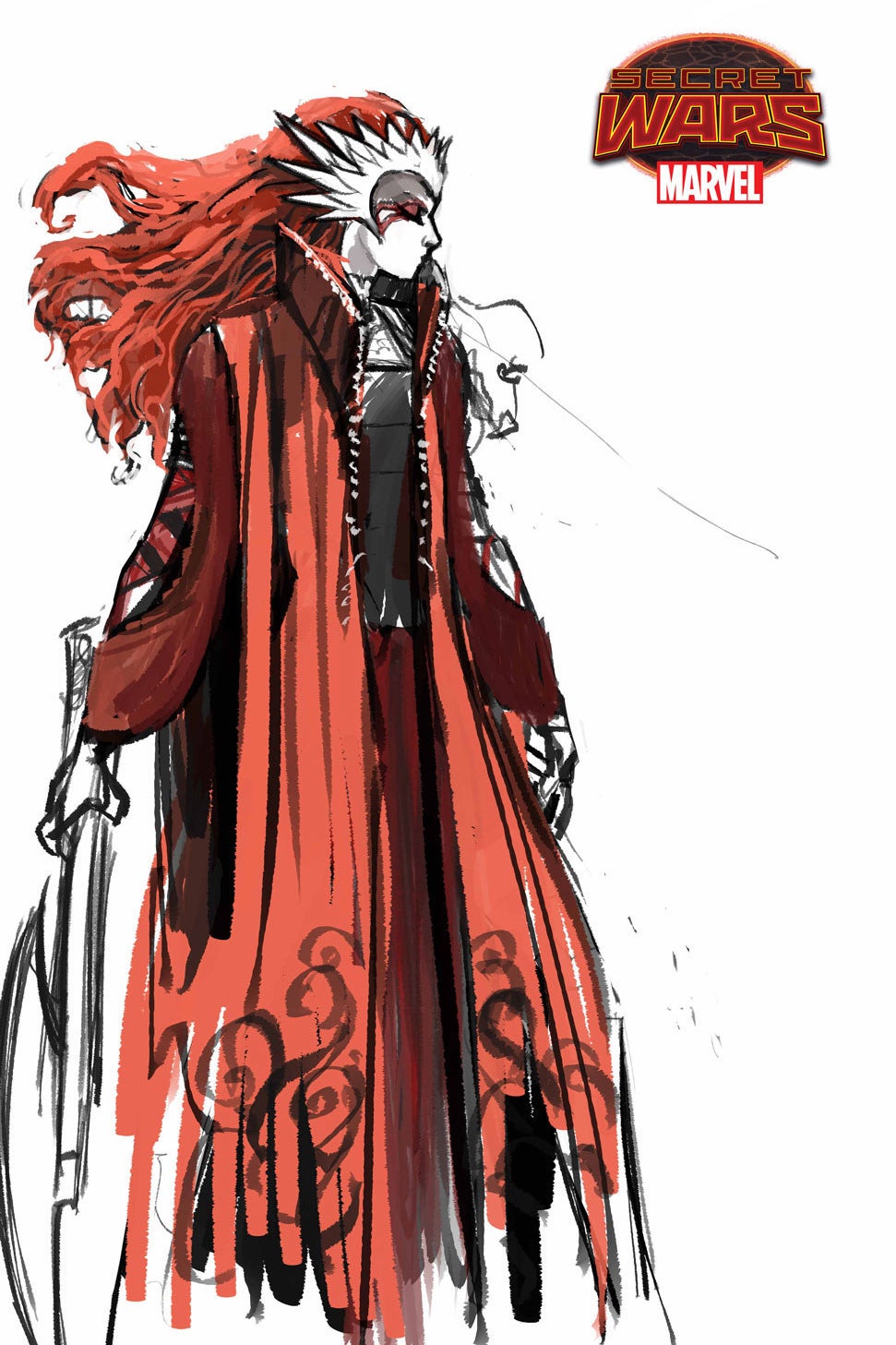
Sana can you tell us a little about how Marvel chooses which characters are going gonna get their own solo books? It's obviously more of an elaborate process than whoever's a popular character at the time, otherwise it'd be all Iron Man all the time and we'd never see new characters like Angela.
SA: Honestly if we thought about, Oh, who do people like right now? we'd have no female titles out there at all. We've sort of had to drive the market a little bit and look at our entire character base, look at all the female characters that exist and try to make sure that we are putting out characters out there that are recognizable, like Black Widow for example, but also start thinking about the newer characters down the road, the characters that we feel can become more tentpole Marvel characters in the larger landscape.
So you know with Captain Marvel and Ms. Marvel, they are two very, very different things: Captain Marvel/Carol Danvers has existed for such a long time, it was really about finding a way to reinvent her and make her more relevant. And with Ms. Marvel/Kamala Khan it was really an idea we had that happened to strike gold, personally I think because the idea was authentic and we were so excited about it. It wasn't necessarily about going out there and being like, Hmmm we need more female minority characters, and then pushing up our glasses and getting to work. It was really more about the larger idea and then the smaller idea of who this character could potentially be down the road.
I'm not gonna pretend that we sat down and had an agenda to start making more female characters, we just started realizing that there's a lot more potential to tap into our growing readership and that tastes are changing. The audience is changing itself, and not just in terms of having more of a female readership, it's about having more distinct sensibilities out there, that people want different types of stories and different types of characters. And Marvel is the place where you can get that, we can create a character for everyone, and that's really what it comes down to.
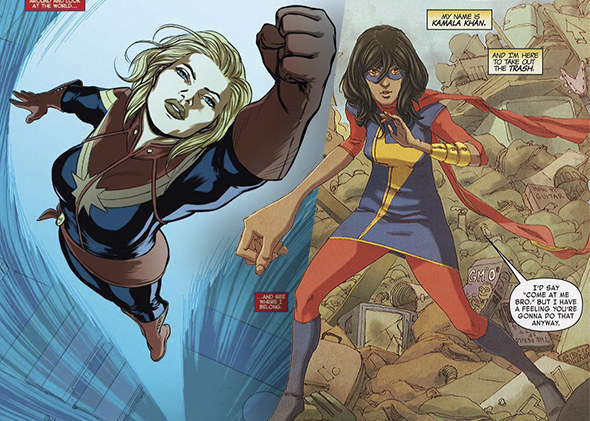
So would you say that Marvel's big push toward diversity is because you're choosing more diverse stories and finding people to tell them, or because you're hiring more diverse talent and those stories are growing organically out of that?
SA: I think it's a combination of everything. When I started working in the industry, the amount of female-led titles, god, I think Marvel at the time only had like one or two and those didn't even last very long. And then when I actually started working at Marvel specifically, I was on the tail end of X23, and it died fairly quickly after I got here. A part of it was that people weren't buying those comics and the other part of it was that because people weren't buying it, we were like OK well we need to be able to sell this content, how do we do it? And something happened, I can't put my finger on it, but whether it's social media or us sort of engaging the audience a lot more, I think people started feeling a little bit more confident in their likes and were OK with saying, "I'm a comic book fan and I want this." Women started becoming more vocal, minorities started becoming more vocal, and the industry started listening it. It started maybe on a small scale with things like the Women Of Marvel panel and we started realizing that there is a legitimate audience out there and I think sort organically we started feeling that. We started saying, "OK let's try this one little thing here, let's try Captain Marvel, let's try Black Widow," and sort of simultaneously people started getting more excited about these characters and people felt OK about being a comic book fan and then they started being proud of it. Something happened in the last five years, and it's not just one thing, it's a combination of new readers coming into comic shops and publishing houses becoming aware of the fact that we can create great content that's catered towards a different type of demographic. That's so exciting; that means we're only going to have so much more diversity in the next few years because the audience out there is open to it.
I've got to say I was at the Women Of Marvel panel at New York Comic Con and that was the most fun I had a Comic Con last year. I remember just taking a moment to look around and thinking, This feels amazing! Just to be in a room full of people who both look like me and don't look like me who were all excited about seeing people who are different than them — I've sort of never had that experience IRL before, only on my Tumblr dash.
MB: Truly amazing!
So how does Marvel scout for talent, how do you find these new, diverse voices to help you tell diverse stories?
SA: It's hard. The reality is, no one is sending me a picture of themselves when they're sending in a pitch. You can't be like, "Oh are you a POC, or a woman?" We don't necessarily want to think in those terms, we want the person's work to speak for itself. That being said, now that we have more opportunities to engage with potential or new creators, our eyes are always open. I'm not gonna pretend I'm not looking for more female voices, I am. I am actively doing that, I am actively trying to get more minorities, talent that I feel have fresh, new voices, working with us as much as I feasibly can. But it's difficult right? You have to be able to sort of wade through who is good, who needs help, and who might just not be there yet. A lot of it is, you know, the Women Of Marvel panels and now that we have the podcast, it's a really good platform to start engaging with those audiences a lot more. I know it's a little bit deceiving because we say Women Of Marvel, but it's much more than the women, it's a celebration of diversity, it's a safe haven for those diverse voices and those potential new voices that can come at Marvel. That's where I meet a lot of people. I think Marguerite, I met you at the tail end of a panel at NYCC and Kelly Sue introduced us?
MB: Yeah I think so!
SA: Yeah, so it's a lot of that. The industry as much as it's growing, is insular in the sense that once you get to know one person you get to know another person, etc etc. For example, we just announced the Captain Marvel And The Carol Corps series, which is super exciting! The idea we've been talking about in all these Women In Marvel panels about you know, connecting with one another and working together in order to get your first gig in comics, and bringing in Kelly Thompson as a co-writer is really the epitome of that. It's Kelly Sue DeConnick sort of passing the baton to this newer writer, working together on The Carol Corps; it's all sort of coming together in that series.
The opportunity really began with us sitting down and talking to somebody who knows someone, who knows another person. Networking, that support system is very important. That's something we're really trying to continue to do no matter how big of a company we get. That's something with us as editors, that's something that we will always make an attempt to do.
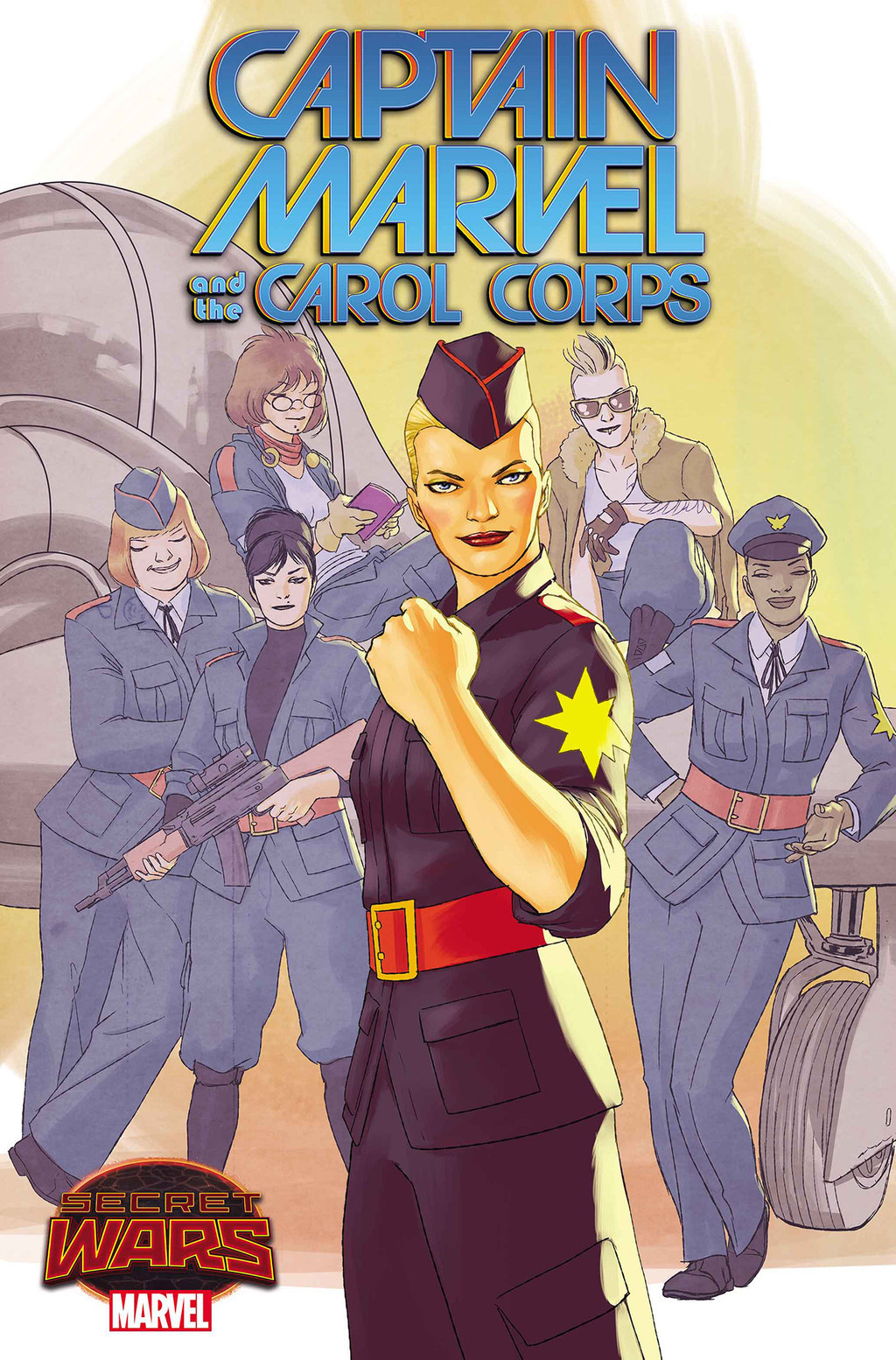
Can you picture the Marvel Cinematic Universe catching up to Marvel comics in terms of diversity in the next few years? Where do you see comics going while MCU is catching up?
SA: Well I can't speak for MCU just because they do things so differently than from what we do. That being said, the movies that are coming out are really reflecting what's been happening in the comics, which is fantastic. The fact that Captain Marvel is a movie, and that it's Carol Danvers' Captain Marvel is beyond huge. I can't explain to you, the moment I heard about it I sat in my chair and thought, This is going to change everything, this is the biggest news I've heard since I've been at Marvel!
Yeah people aren't just going to be cosplaying her at Comic Cons, in a few years, there'll be little girls dressing up as her for Halloween and everyone will know who they're supposed to be.
MB: I remember where I was when I found out that was happening; it's engraved in mind, I will always remember where I was when I heard we were getting a Carol movie.
SA: Yes! I think back to the time when the pitch first happened, to when the first issue went out and we got all this hate mail from people — how dare you change her costume, how dare you cut her hair, how dare you — there was so much how dare you! And I think that's how CarolCorps really came together. It was sort of this collective protection of Carol Danvers, to say, "No this is what we need, this is what the industry needs." And that was just what, three years ago? And now we suddenly have an announcement of that movie? That's crazy to me! That's totally insane! So there is something happening, I'm not sure what MCU's mentality is, I'm not sure what [Marvel Studios President] Kevin Fiege has planned. But in my mind, I don't think that you can ignore the fact there is change in the industry and that change comes in the form of diversity and I'm not surprised that they're tapping into that.

Where do you think Marvel can improve in terms of diversity?
SA: Honestly, we need more diverse voices. We more more women at the table, we need more people of color at the table, and that's the truth of it. I think we'll get there. It's really something we're aware of and we have a desire to do. Having accomplished what we've accomplished in the last three years alone between Captain Marvel, and Ms. Marvel and all the female titles we have, and the new female creators working with us, I think that sort of says a lot about the potential in the next few years.
